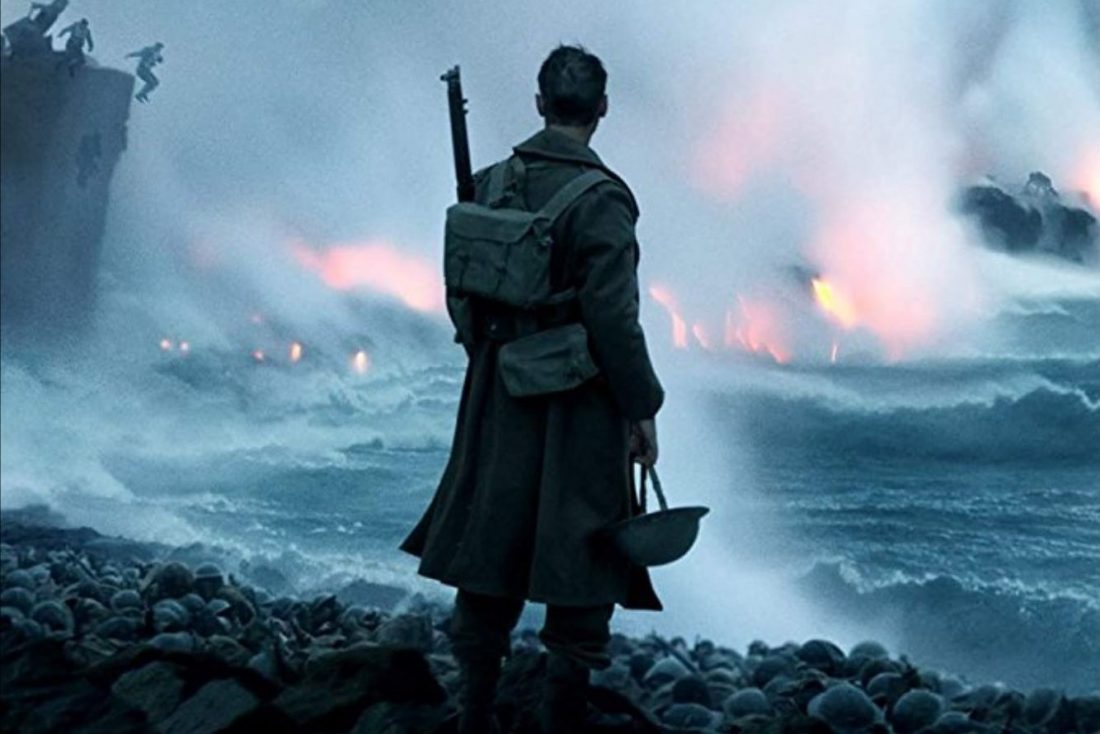SPOILER ALERT: This review does indeed contain spoilers.
The much-anticipated military thriller Dunkirk by director Christopher Nolan is not the war film I was expecting.
Dunkirk rethinks the genre of military films. We are used to having films about particular historic battles retell a great victory, shed light on some lesser-known heroics, or give us a new perspective on famous events. I expected Dunkirk to go the second and third routes. Dunkirk does give us different angles of the British experience of the famous Operation Dynamo, the evacuation of British troops from the beaches of Dunkirk, France after their retreat from the rapidly advancing German army. It also focuses on a few characters and their experience of the events. But this is no 21st century version of The Longest Day, the 1962 saga of D-Day. It is effectively the inverse. Where The Longest Day told of the Allied invasion of the beaches of Normandy in June 1944 as the beginning of the Allies’ defeat of the Germany army occupying France, Dunkirk is less a rehashing of historical details and more a return to the nightmare that unfolded almost exactly four years earlier.
In Dunkirk, Christopher Nolan is not rehearsing a great victory of good over evil through the heroics of thousands of troops. Nor is he introducing us to the historical figures and decisions that changed the war (turn to Darkest Hour for a retelling of the power players in Operation Dynamo). Instead, we the audience meet and follow anonymous fictional characters who must endure the reality of those beaches and waves. Dunkirk is less a history and more a flashback.
Before I saw Dunkirk, I resisted the urge to check Wikipedia and review the events leading up to the evacuation. Already aware of the Operation Dynamo’s outcome, I didn’t want to further spoil the drama that might unfold onscreen by informing myself of its details. I didn’t need to worry: I spent the first third of Dunkirk utterly confused. The film unfolds following three groups—a British soldier on the beach, an English boat piloted by a brave (and desperate) father at sea, and a Royal Air Force pilot in the air. Each scene change from land to water to sky was asynchronous: one scene was day, another night; a character who was plucked from the sea miles from France later appears (earlier in the action) on a ship leaving Dunkirk. I could not get my bearings or make out when in the events each scene were happening; Wikipedia would have been no help.
The mismatched timeline is a characteristic of Nolan’s films that works to great effect in Dunkirk. This asynchronous action allows the audience to slowly realize how part of the miracle of the Dunkirk evacuation was the immense cooperation of countless men and women in the Army, Navy, and Royal Air Force that converged to rescue those thousands who were stranded on those hellish beaches. Moreover, the disjointed timeline—along with the anxious musical score—builds the tension necessary to compel the action forward and hold our interest in events where the outcome is already known.
Finally, I found “Nolan Time” particularly compelling in Dunkirk, as it captured something of the experience of the evacuation: the confusion of the retreat; the unending, impossible quest for survival; the lack of information that feeds the dread of waiting and leeches away hope for rescue. It is this final point that serves to connect audiences emotionally with the experience of Dunkirk: the confusion and lack of information.
In a film about an infamous defeat, set during a war that we famously win, created at a time when information is available to us at all times, this is impressive. Nolan toys with our obsession with “knowing” as well as our knowledge of the outcome of the evacuation of Dunkirk, and he inverts our expectations. Most films about famous wars match their events to the greater drama of the progress of historic battles. Much of the enjoyment of The Longest Day, Saving Private Ryan, and other films about World War II stems from how they retell what is already known.
Instead, Dunkirk plays up our deep discomfort with “not knowing” in an information age. Nolan succeeded not only in putting audiences in the place of the soldiers and sailors at Dunkirk, but he also succeeded in putting us inside their terrified, confused, desperate, ignorant states of mind. In our anxious age of “knowing” all—where we check the news at regular intervals to see what latest tragedy, scandal, disaster, or act of violence has occurred since the last one; where social media keeps us connected to everyone and fills our working memories with their banal daily details; where our smartphones’ email and messaging apps notify us at all times so that we feel phantom vibrations when we are disconnected—the not-knowing of what would happen to each character, what would happen to each ship, what would happen next from each perspective of beach, sea, and air was excruciating.
Dunkirk is a drama of disorientation—a disorientation that I can only imagine mirrors the experience of actual combat. Incredibly, Nolan draws the audience into that nightmare with hardly any of the gore or blood that we have grown used to in this genre of film. Instead, his use of time, though a trite storytelling trick, also serves as a means of drawing the audience into solidarity and compassion with the characters on the screen. We, in a small way, “suffer with” the characters on the screen as we experience their terror and fear, relief and shame.
With regard to Dunkirk’s characters and storytelling, again Nolan subverts our military film conventions: here there are no certain victories for the side who fights for justice and truth. Here the enemy (totally unseen) wins the day. Here is a film celebrating retreat; honoring the fleeing army after their defeat. Dunkirk asks us to make sense of Operation Dynamo’s effective history: What honor in retreat? What inspiration in seeming failure? It asks the same questions as the genre of military films, but gives us new answers: Who are the heroes? What does bravery look like? What is a victory?
Nolan also makes us the companions of the survivors as they come to terms with the ignoble aspects of their survival and as the guilt of their survival gives way to fear: as surely as they waited for either death or rescue, so too will shame undoubtedly greet them on their return to England. Dunkirk closes with our soldier and his fellow soldiers processing the many complicated emotions that greet those who come home from war. Expecting others’ judgment of their failure to stop the Germans, they read each interaction as disapproval. “Well done, lads. Well done,” a man handing out supplies greets them. “All we did was survive,” a soldier replies, condemning himself. “That’s enough,” the man responds. “He couldn’t even look us in the eye,” another soldier laments.
But we in the audience see that this volunteer, of an age to have fought in the Great War, must have been one of the countless blinded by poison gas in the trenches. Does this man, who personally knows the suffering that led to victory in World War I, also know what the survivors of Dunkirk cannot yet see? That there can be good even in this defeat? For the sake of the nation, for the sake of their families, it was enough to simply survive. He knows that their survival—after all that waiting—was a miracle. That the rescue of so many in such dire circumstances compounds the miraculous nature of Operation Dynamo. It is this rescue, the survival of these soldiers, that bolsters the British in the coming months as they fight on and prepare for the seeming inevitability of a German invasion. Cheering crowds meet the evacuated soldiers as they return to England, the newspapers informing the rescued soldiers of Winston Churchill’s famous speech, which frames their evacuation and retreat as one of many losses that will take place on the road to Britain’s eventual victory.
The evacuation at Dunkirk should have been a source of shame, but instead it became a point around which the nation could rally—a small flame of a miracle in the midst of defeat, fanned to ignite a nation to fight on. Dunkirk celebrates the inverted victory to which Churchill pointed his nation’s attention: in this defeat and retreat was great bravery, great heroism, great honor, great inspiration. Nolan inverts our tropes of spotless heroes, good defeating evil, innocence and bravery rewarded with survival. I do not know firsthand what war is, but it is certainly not so clear-cut as most military films would have us believe. Even our best soldiers are still fallible, fragile human beings; yet even the smallest boat can pluck a dozen men from the sea, a guileless adolescent can demonstrate bravery miles from the enemy’s weapons, one pilot in one airplane can give scores of the retreating a chance to survive until their next obstacle.
Each event in Operation Dynamo contributed to saving a life; each life saved was a miracle. The survival of the soldiers on Dunkirk’s beaches was itself victorious. Wars are not won by linear succession of great victories. Justice is not attained by win after win. Evil is not defeated without suffering and struggle. Good people are killed and the brave show cowardice. Heroes often do not make it back home. And in the midst of all of this, Dunkirk recognizes the little acts of valor that can make heroes out of the smallest of us; it champions the inglorious work of just surviving in times of unthinkable adversity.
It reminds us that defeat is not the end of the story.

